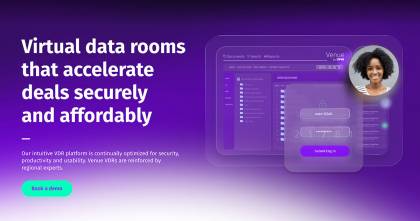Sharing business documents containing sensitive information is an everyday task, and a critical one. But sharing them with external parties via unencrypted email or Dropbox can pose security or exposure risks that can have disastrous consequences. When security and speed are essential, investment banks, private equity firms, pharmaceutical companies, legal firms, healthcare, and government agencies rely on virtual data rooms (VDRs), such as DFIN’s Venue.
As the volume and types of sensitive documents increases to include financial information, confidential company data, contracts, legal agreements, clinical trial research, medical documents, government filings, and more, companies that may never have seen a need for a VDR are reconsidering.
Venue, a secure and intuitive virtual data room platform, is especially flexible. It can be used for transmitting sensitive data and sharing confidential documents with external parties, streamlining collaboration among authorized stakeholders, and meeting regulatory compliance. This can help organizations mitigate the security risks associated with traditional document sharing methods (hello email!) and establish a robust framework for safeguarding their critical information.
Many organizations need advanced security embedded at every level — businesses in regulated industries, for example. Venue can help them protect personally identifiable information (PII) and confidential information using multi-factor authentication, 256-bit encryption, virus/malware scanning, secure information rights management (IRM) — this means that Venue users can provision permissions of precisely who can see what — and dynamic watermarking. Venue has the highest levels of infrastructure security and meets stringent auditing and reporting compliance requirements including SOC2 Type II auditing and reporting and ISO/IEC 27001:2013 compliance.
Additionally, organizations speeds document processing by 50 percent using Venue by automating multi-file redaction in uploading documents without overwriting original files. This comes in handy when sharing the mountains of confidential documentation associated with a merger between two companies. Venue can facilitate the process and ensure compliance with regulatory requirements: such as the merger agreement, letter of intent, due diligence documents that include financial statements, intellectual property records, tax returns, shareholder materials, ancillary agreements, and of course the regulatory filings to SEC regulators and other relevant government agencies.
Consider how Venue can help enterprises in the following sectors:
- Investment Banking and Financial Services. Investment banking involves complex financial transactions and requires the secure exchange of highly confidential information. When conducting mergers and acquisitions, raising capital, or managing due diligence processes, investment banks deal with sensitive financial statements, contracts, valuation reports, and other critical documents. A VDR ensures that all parties involved, including buyers, sellers, legal teams, and regulatory bodies, can securely access and review the required information, while maintaining strict control over document access and data integrity.
- Biotechnology and Pharmaceuticals. These industries heavily rely on research and development, clinical trials, and intellectual property protection — dealing with sensitive information on a regular basis, such as proprietary formulas, patient data, drug trial results, and patent applications. A VDR provides a secure platform for collaborating with external partners, including contract research organizations, regulatory agencies — such as the FDA — and potential investors. It enables secure document sharing, version control, and audit trails, while ensuring compliance with data privacy regulations, such as HIPAA or GDPR.
- Legal and Litigation Services. Law firms and litigation teams handle sensitive client information and confidential legal matters. When working on cases involving intellectual property disputes, corporate litigation, or regulatory investigations, lawyers need a secure platform to store, manage, and share sensitive documents, such as depositions, evidence files, expert reports, and legal briefs. A VDR offers granular access controls, watermarking features, and document rights management to maintain confidentiality, prevent unauthorized sharing or printing, and provide a secure collaboration environment for legal teams and their clients.
- Healthcare. Hospitals, clinics, and healthcare providers regularly handle and exchange sensitive patient information, including medical records, diagnoses, and treatment plans. Secure communication of these documents is crucial to maintain patient privacy and comply with healthcare regulations.
- Government Agencies. Government bodies often handle classified information, national security documents, personnel records, and sensitive government projects. Secure communication is critical to protect national interests, prevent data leaks, and maintain public trust.
- Human Resources. HR departments handle sensitive employee information, including salaries, benefits, performance reviews, and disciplinary actions. Secure communication is necessary to protect employee privacy and prevent unauthorized access or misuse of this data.
Nine Risks of Sharing Sensitive Documents without a Virtual Data Room
Recognizing the inherent risks associated with sharing sensitive documents will prompt organizations to evaluate and adopt precautionary measures to safeguard their document confidentiality and integrity. Consider how hard it would be to thwart the following data security risks without using a VDR for sensitive document transmission:
- Confidentiality breach
- Data breach
- Privacy violations
- Regulatory violations
- Intellectual property theft
- Fraud, financial fraud, medical fraud
- Brand damage
- Identity theft
- Financial repercussions
When the secure sharing of sensitive documents with third parties is vital to protect the privacy, confidentiality, and intellectual property rights, secure document transmission is imperative. Did you know that DFIN’s Venue recently won the Global InfoSec Award for Publisher’s Choice Virtual Directory Services? Read more here. In today's complex and ever-changing cybersecurity and regulatory landscape, helping organizations streamline processes, establish governance, and demonstrate regulatory compliance — while prioritizing security — is of utmost importance to us at DFIN. This philosophy guides everything we do.


